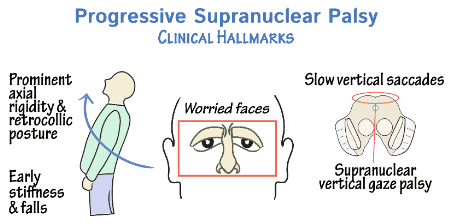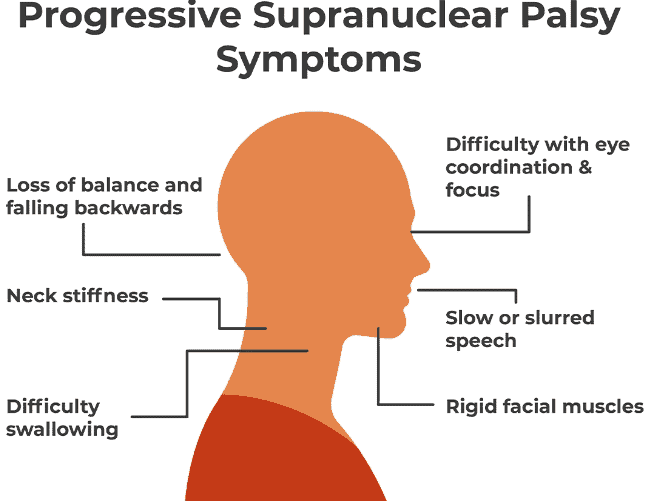Understanding End-Stage PSP: A Guide for Families
Published on April 20, 2024
Updated on July 22, 2024
Published on April 20, 2024
Updated on July 22, 2024

Table of Contents
Caring for a loved one with Progressive Supranuclear Palsy (PSP) can be a journey filled with challenges and love. Although the condition may not be well-known, it touches the lives of many families. As you walk this path, understanding PSP and how it affects your loved one is crucial. This guide supports you with knowledge and empathy, helping you provide the best care possible.
Progressive Supranuclear Palsy is a rare brain disorder that worsens over time. It affects balance, movement, vision, speech, and swallowing. Imagine the brain as a control center, sending signals to different body parts. In PSP, some signals get mixed up or lost, making everyday tasks difficult.

PSP is often confused with Parkinson’s Disease because they share symptoms like stiffness and trouble with movement. However, PSP progresses more rapidly and has unique signs, such as difficulty moving the eyes and problems with balance that can lead to falls. Unlike Parkinson’s, PSP treatments are more about managing symptoms since the underlying causes differ.
PSP starts slowly and gets worse over time. Early on, someone with PSP might fall often or have trouble looking at things. As it progresses, they might find it hard to speak or swallow. It’s like a light dimming gradually, affecting more and more of the person’s abilities.
Knowing about PSP helps you understand what your loved one is going through. But empathy—putting yourself in their shoes—is just as important. It’s about more than just medical care; it’s about connecting heart to heart. When you combine knowledge with empathy, you create a caring environment that supports both of you.
Remember, you’re not alone on this journey. There are resources and communities ready to help. You can find strength and hope along the way by learning and sharing.

When a loved one reaches end-stage Progressive Supranuclear Palsy (PSP), it means their journey with this condition is in its final chapter. A significant decline in health and abilities marks this stage. It’s a time when your loved one may need constant care and when the simple things that once brought joy, like sharing a meal or a conversation, become much harder.
As PSP enters its final stage, you might notice your loved one having more trouble with balance and walking. They may not be able to communicate as they used to, and even swallowing can become difficult. It’s common for someone with end-stage PSP to need help with all their daily activities, and they may spend much of their time in bed.
The medical challenges at this stage are complex. Your loved one might lose weight rapidly, and they could be at risk of infections or injuries from falls. It’s also a time of emotional challenges for you and your loved one. Feelings of sadness, frustration, and exhaustion are normal. Remember, it’s okay to seek help and take time for yourself. You’re doing an incredible job in a tough situation.
Caring for someone with end-stage PSP is about providing comfort and dignity. It’s about being there, holding a hand, and offering love. You’re not alone in this. Reach out to healthcare providers, support groups, and friends—they can be your pillars during this time. Remember, your care makes all the difference in your loved one’s life.
Caring for someone with end-stage Progressive Supranuclear Palsy (PSP) is a labor of love that requires patience and understanding. It’s about helping your loved one with their daily needs and ensuring they feel supported and comfortable. As PSP progresses, your role as a caregiver becomes even more vital. You become the hands, the voice, and the strength of your loved one.
Every day with PSP can bring new challenges. Here are some strategies to help you manage:
Mobility and communication are often affected in PSP. Here’s how you can help:
Nutrition is a critical part of care. Here’s how to ensure your loved one gets the nutrients they need while staying safe:
Remember, you’re not alone. Contact healthcare professionals, support groups, and other caregivers for advice and support. Your dedication makes a world of difference in the life of your loved one with PSP.
When a family member is facing end-stage Progressive Supranuclear Palsy (PSP), understanding the medical care they need becomes a top priority. Medical management at this stage focuses on comfort and quality of life. It involves regular check-ups, managing symptoms with medications, and sometimes, using equipment to help with daily activities. The goal is to ensure your loved one feels as comfortable as possible.
Palliative care is all about comfort and support. It helps manage symptoms and provides relief from the stress of illness. Hospice care is similar but specifically for those in the final months of life. Both focus on the person, not just the disease, ensuring dignity and respect during these tough times.
In the end stage of PSP, treatment options are about managing symptoms. Medications can help with movement, mood, and other PSP-related issues. Therapies like physical therapy or equipment like special glasses can sometimes help with daily tasks. The aim is to maintain the best possible quality of life.
Coordinating care for someone with PSP means bringing together a team of healthcare professionals. This team might include doctors, nurses, therapists, and social workers. They work together to create a care plan tailored to your loved one’s needs, ensuring they get the best possible support at every stage of their journey.
Remember, you’re not alone in this. Resources, support groups, and healthcare teams are ready to help you and your loved one through this time. Your love and care mean the world to them.
Caring for someone with end-stage Progressive Supranuclear Palsy (PSP) is a deeply loving act, but it’s also incredibly demanding. As a caregiver, you give so much of yourself every day. It’s important to remember that your well-being matters too. Taking care of yourself isn’t just good for you but also for the person you care for.
It’s normal to feel a range of emotions as a caregiver. You might feel love, sadness, or even frustration, and that’s okay. Taking care of your emotional health is a key part of being a strong caregiver. Here are some ways to support your emotional well-being:
You don’t have to do this alone. Building a support network can help share the load and provide various help. Here’s how to start:
There are important legal and financial steps to consider as a caregiver. These steps can help ensure that your loved one’s wishes are respected and that you have the resources you need to provide care:
Remember, caring for yourself is not a luxury—it’s an essential part of caregiving. Building a support network and addressing legal and financial considerations can create a strong foundation for you and your loved one during this challenging time.
As we conclude our end-stage Progressive Supranuclear Palsy (PSP) guide, it’s important to reflect on the journey you and your loved one have traveled. It’s a path marked by courage, love, and resilience. While PSP may bring many challenges, it also brings opportunities for deep connection and compassion. Remember, you’re not just caregivers but beacons of hope and pillars of strength for your loved ones.
Embracing this journey with compassion means recognizing that every moment, whether tough or tender, is precious. It’s about finding strength even on the hard days and celebrating the small victories. Compassion isn’t just a feeling; it’s an action. The gentle touch, the patient listening, and the quiet presence say, “You’re not alone.”
You don’t have to navigate this journey without help. There are resources and support systems designed to assist you:
These organizations understand the complexities of PSP and are here to support you and your family. They can offer the knowledge, care, and empathy you need to continue providing the best care for your loved one. Remember, reaching out for help is a sign of strength, not weakness. Utilizing these resources ensures that you and your loved one have the support needed to face PSP with dignity and grace.
Progressive Supranuclear Palsy (PSP)
Parkinson’s Disease vs. Progressive Supranuclear Palsy
What is Progressive Supranuclear Palsy (PSP)
136 Care of patients with progressive supranuclear palsy in the hospice setting: an audit
Top 30 FAQs About Hospice: Everything You Need to Know
Understanding Hospice Care: Is it Too Early to Start Hospice?
What’s the process of getting your loved one on hospice service?
Picking a hospice agency to provide hospice services
National Hospice Locator and Medicare Hospice Compare
CaringInfo – Caregiver support and much more!
Surviving Caregiving with Dignity, Love, and Kindness
Caregivers.com | Simplifying the Search for In-Home Care
As an Amazon Associate, I earn from qualifying purchases. The amount generated from these “qualifying purchases” helps to maintain this site.
Take Back Your Life: A Caregiver’s Guide to Finding Freedom in the Midst of Overwhelm
The Conscious Caregiver: A Mindful Approach to Caring for Your Loved One Without Losing Yourself
Everything Happens for a Reason: And Other Lies I’ve Loved
Final Gifts: Understanding the Special Awareness, Needs, and Communications of the Dying
Providing Comfort During the Last Days of Life with Barbara Karnes RN (YouTube Video)
Preparing the patient, family, and caregivers for a “Good Death.”
Velocity of Changes in Condition as an Indicator of Approaching Death (often helpful to answer how soon? or when?)
The Dying Process and the End of Life
As an Amazon Associate, I earn from qualifying purchases. The amount generated from these “qualifying purchases” helps to maintain this site.
Gone from My Sight: The Dying Experience
The Eleventh Hour: A Caring Guideline for the Hours to Minutes Before Death